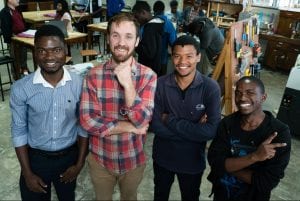Matt, our Design Studio Manager at Malawi Polytechnic, is back as a guest blogger!
Check out his latest musings:
A few of my students are competing in the FIRST Global Robotics competition, an international competition in which teams design a robot to solve a problem. This year’s challenge is around water access and sanitation. FIRST Global is a great program to encourage STEM, innovation, and collaboration from a very technical standpoint.
So far, the team has been having some trouble getting the hang of the competition, but it clicked this past week when they said: “we’ve been learning how to solve real problems here at the studio, but we’ve just realized the robotics competition is more like a game, not real life.” This is deliberate self-flattery, of course, but it still felt good to hear them say it and make the connection.
A group of five girls are starting a female engineering club. They’re dissatisfied with the number of women in engineering, and the retention and graduation rates of female engineering students, so they’re doing something about it.
They’re still working through the details, but making considerable progress. During one meeting, the president of a well-established student club came to give them advice. He suggested they start the female engineering group within another organization, under the umbrella of his club, for example.
They listened, asked difficult questions, thanked him for coming, and asked him to leave so they could discuss. It was brilliant to watch these younger female students be so in control. You will be hearing more about each member of this group in the coming weeks.
On a separate note, the MacArthur 100&Change competition has been a constant presence here since the big announcement. Thinking about the scale of impact we could achieve is motivating. Thankfully, we all have a healthy amount of skepticism to keep us grounded. We’ve been fairly critical of how we’ll be able to scale what we’re doing tenfold…not to worry — it is an optimistic skepticism!
The 100&Change process reminds us to look at the work we’re currently doing with a broader lens. It generates a stark juxtaposition; in the same day, we’re cognitively going from “how do we reduce neonatal and maternal mortality by 50% in 5 years?” to “how do I fix this pulse oximeter and should I lend this student money for food?”
Thanks for reading and til next time,
Matt

